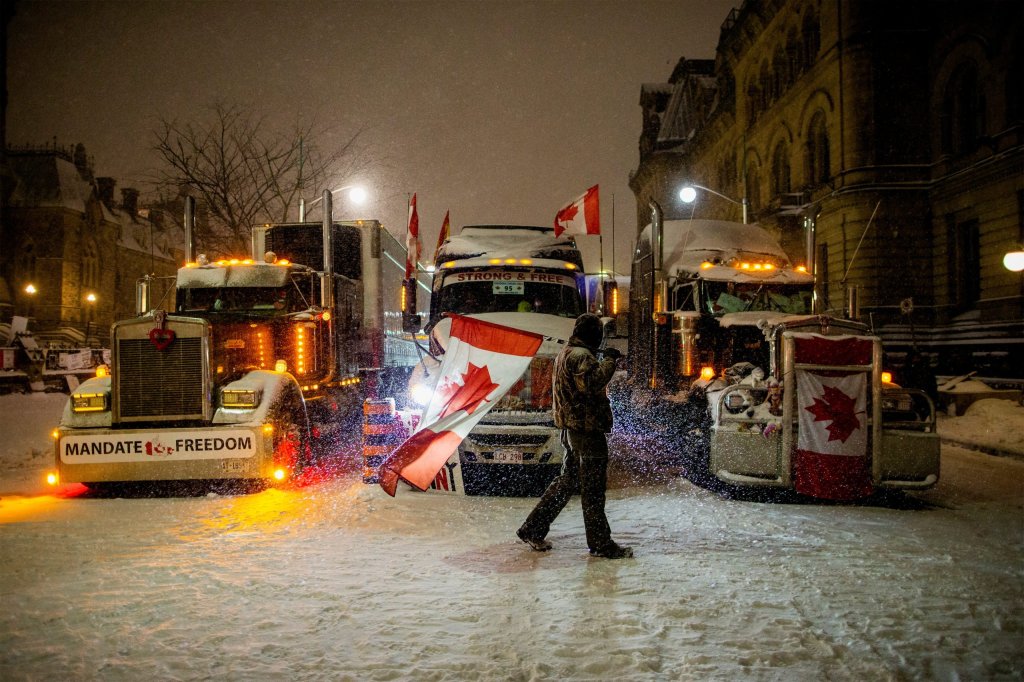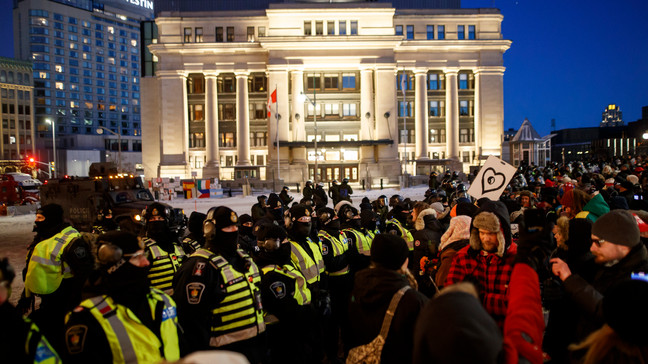Canada needs a nationally coordinated public safety response

While the occupation of Wellington Street and the immediate side streets in Ottawa is now essentially at an end, there is much work yet to be done.
The immediate area around Parliament is now a restricted zone enclosed by concrete barriers and steel fencing.
While the barriers and heightened police presence are necessary and will remain the norm in the short term to ensure the occupiers don’t return and again become entrenched, the current status quo is not sustainable and is not something we want to see in any Canadian city.
It would be naïve to think that because the occupiers have been removed the sentiments that sparked the movement have been extinguished.
We have in Canada an extremely fractured society with a minor but substantial segment that feels unrepresented and not listened too. This minority has manifested itself not only in Ottawa but also in the form of border blockades in Ontario, Manitoba, Alberta and British Columbia.
Although the current unrest started under the banner of the so called Freedom Convoy and Covid19 related restrictions that applied to truckers involved in cross border commerce, it quickly expanded to draw in other segments with all manner of grievances against all levels of government.
The initial demands of the Freedom Convoy that called for the overthrow of Canada’s democratically elected government left little room for politicians to meet with and negotiate with the protesters-turned-occupiers. The Liberals essentially resorted to ignoring the protesters and even name calling. The opposition took a much different approach by initially identifying with the protest and coming very close to endorsing it. Both approaches were politically motivated and not helpful in terms of addressing the issue at hand or ending the protest/occupation.
I’m not going to delve into the politics of solving what is a very difficult and complex issue. Rather I will address from a policing perspective what further steps need to be taken.
The Police Response
The initial response by Ottawa Police will become the subject of much discussion and analysis as the reviews and inquiries that have been called for get underway. Not being privy to what intelligence information and resources were available to Ottawa Police at the outset, no attempt will be made here to assess responsibility for what followed in Ottawa.
What the Police Need
Legal Clarity
Police are in the unenviable position of being mandated with maintaining the delicate balance between law and order and anarchy. The public, politicians and the media, all have high expectations in terms of police responding to protests appropriately. Police executives are very mindful that a failure to maintain the balance between the right to protest under the Charter of Rights and Freedoms and blatant lawlessness as demonstrated in Ottawa will result in push back from all sides.
The question that needs to be clarified is the line between what is a lawful protest and what is an unlawful assembly.
At present there is no clear definition of the point at which a protest becomes an unlawful assembly. Equally problematic from a police perspective is that the definition that is applied is not a legal definition but rather a political definition. In other words it changes from situation to situation depending on the views or position of the government, and in some cases, who the protesters are.
In a situation like the one in Ottawa there is general agreement that a major flaw in the police response was the failure to act in a timely manner.
If, for example, there were a clear legal definition which stipulated that protests cannot last longer than a specific period of time and that vehicles or other implements or devices cannot be used to block roadways as part of a protest, police would be in a much better position to deal with protests and to ensure that they did not turn into entrenched occupation.
Emergency Legislation
The Provinces and the Federal government need to enact appropriate legislation that allows police the power in an emergency situation to swiftly deal with a broad range of emergency situations — illegal protests, blockades, illegal occupations — in a timely manner without having to invoke the Federal Emergencies Act.
Resources and Staffing
There needs to be a national police emergency response capability to quickly and efficiently deal with emergency situations such as the recent occupation in Ottawa, and the blocking of border crossings, highways, railways, and other vital infrastructure.
In Canada, most major municipal, Provincial police agencies and the RCMP all have emergency response and crowd control capabilities. Although these are well trained and equipped, there are differences in the approaches that each take in terms of tactics and strategies. In addition, the command structures while similar are not identical. As well, the ability to move municipal, provincial and federal police personnel into other jurisdictions is fragmented because of jurisdictional issues.
There needs to be establishment of a national public safety umbrella organization that oversees the equipping, training, and command and control structure of all the various Public Safety Units across Canada and funded Federally.
Governments at all levels in Canada need to pass the required legislation and put in place the required Memorandums of Understanding so that in emergency situations the various Public Safety Units from across Canada can be quickly brought together and seamlessly deployed.

I like the author.
On Sun, Feb 20, 2022 at 2:54 PM Policing, Politics and Public Policy wrote:
> Menno Zacharias posted: ” Canada needs a nationally coordinated public > safety response While the occupation of Wellington Street and the immediate > side streets in Ottawa is now essentially at an end, there is much work yet > to be done. The immediate area around Parliam” >
LikeLike
As always Menno’s comments are articulate but concise and factually correct. The downfall here is the political intransigence of our federal parties. They all seem more interested in scoring party points rather than in putting the needs of the nation first from time to time
LikeLiked by 1 person
With respect to Ottawa and the Parliament Hill area, I would envision a beefed-up Parliamentary Protective Service responsible for an expanded area around Parliament and with slightly different parameters for what is allowed or more aggressive rules of engagement to make sure that the area stays secure.
LikeLiked by 1 person
I believe as Menno indicates that the initial Police response was guided by the lack of adequate legislation governing these kinds of events. The police have been roundly criticized for their actions this year. Public pressure has led to the police taking a strategy of containment and waiting protesters out! This is innapropriat when a country is facing extremists whose motivation is to disrupt the business of the nation! The police have been sandwiched between politics and misguided activists! The government needs to support our police and provide adequate guidance. They need to stop leaving our police hung out to dry!!!
LikeLike
I have been watching the media coverage with great interest and during the last few days as police executed their operational plan and cleared the streets in Ottawa both the politicians and the media have been very supportive of police actions. I’ve sensed that as the protesters have been cleared out and the the streets had been restored to the ‘new normal’ that is, not entirely open but free of protesters, the slant and tone of media reporting is changing from one of support for the police to a second guessing and questioning police actions. I think we will see a similar change in tone from some politicians as well. As so frequently happens in these scenarios the police will be stuck in the middle and will become the punching bag for some members of the media, politicians and certain segments of the public.
LikeLike